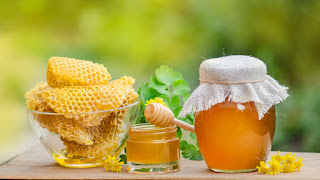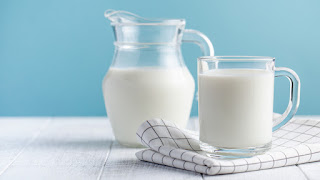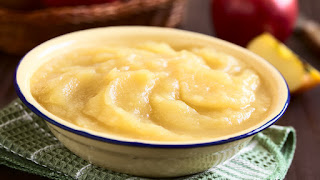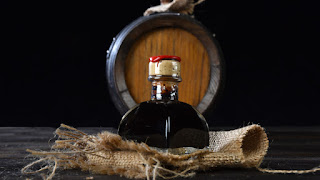You've just finished dinner when suddenly there's an unpleasant burning sensation in your chest. At first, you think it's just indigestion, but it doesn't go away. If this sounds like you, then you may be experiencing acid reflux (via American Academy of Family Physicians), and if you experience it multiple times a week, then you may be dealing with the chronic version of this condition more commonly called gastroesophageal reflux disease or GERD (via Healthline).
Simply put: When you eat, food travels down your esophagus to your stomach. However, at the end of your esophagus is a muscle called the lower esophageal sphincter (LES), which acts like a safety value to keep your stomach acid inside the stomach where it belongs (via Healthline). When the LES is weakened, stomach acid escapes into your esophagus, causing symptoms like heartburn, the American Academy of Family Physicians explained.
The good news is dietary changes can make a big difference when it comes to reducing the frequency and severity of acid reflux. Is there a one-size-fits-all diet for it? No, everyone is different. But there are some common patterns that suggest which foods you should eat, and which to avoid.
Avoid: French fries
Sorry to all the french fry lovers out there, but this fast food favorite can be bad if you have acid reflux. This is because it's a high fat food, and when it comes to acid reflux, fat is definitely not your friend.
According to Healthline, foods that have large amounts of fat can trigger your acid reflux in two ways. First, they can lower the pressure on your lower esophageal sphincter, making it less likely to properly function. Second, having fat filled food in your stomach means your stomach will empty slower, increasing the chances of its acid slipping out into your esophagus.
However, there is a little good news on the french fry front. As Healthline explains, how much food you eat at a meal makes a difference when it comes to acid reflux. So, if you're out with a friend and want to sneak one or two french fries from their plate, that probably won't be enough to set off any symptoms. Still, you should keep a food diary and note everything you eat just in case you have a sensitivity.
Eat: Saltine Crackers
This might sound like one of those home remedies your grandmother would recommend but don't underestimate grandma. As Dr. C. Prakash Gyawali tells Livestrong, while consuming food in general can help neutralize stomach acid, "crackers have been noted to reduce the burning sensation" that people experience with acid reflux. But there are a few things to keep in mind.
Let's face it: Crackers can be a little bland on their own. But if you want to lessen your reflux-related heartburn, then bland is good. In fact, spreading butter or margarine on them can make your symptoms worse (via Livestrong). This is thanks to the fat content, which can impact how well your lower esophageal sphincter functions and how quickly your stomach empties (via Healthline).
So, what about salted crackers? Are they okay to eat for acid reflux? Well, when asked, Dr. Gyawali said it's probably not important if you decide to eat salted or unsalted crackers as far as acid reflux is concerned. However, eating too much salt in your diet can cause other possible health issues.
Avoid: Coffee
Sadly, quite a few popular foods can be triggers for acid reflux. Case in point: coffee, that morning fuel for so many. In fact, health care professionals will often advise their patients to cut back on how much coffee they consume (or cut it out altogether) if they're dealing with chronic acid reflux or GERD. But is coffee getting a bad rap?
As Medical News Today explains, it's the caffeine in coffee that is believed to aggravate GERD symptoms in some people. And yet, Stanford University associate professor Lauren B. Gerson told Gastroenterology & Hepatology that there are no studies that have figured out what happens when a person with acid reflux cuts caffeine out of their diet.
Even without official evidence, however, some people have reported coffee as aggravating their acid reflux (via Medical News Today). It all comes back to the fact that everyone is different and thus reacts differently to various foods and drinks. If you think coffee is a trigger for your acid reflux, try cutting back on it and see if your symptoms improve.
Eat: Licorice
When it comes to the strong, distinct taste of licorice, most people either love it or hate it. But if you are dealing with acid reflux, then a cup of licorice tea might be just what you need to sooth your heartburn symptoms.
According to Healthline, while many herbal teas in general are good for digestion, nausea, and gas, licorice tea in particular helps prevent stomach acid from irritating your esophagus. How? By encouraging your body to produce more mucus. Yes, mucus isn't just in your respiratory system. And when it comes to your esophagus, that mucus can act as a protective barrier against your stomach's acid.
Besides licorice, chamomile, marshmallow, and slippery elm teas can help with the symptoms of acid reflux (via Healthline). However, you should speak with your health care professional since some herbs should not be a part of your diet if you are taking certain medicines. And while mint teas are technically herbal teas, they also can make acid reflux symptoms worse simply because they contain ingredients like spearmint and peppermint.
Avoid: Soda
On the surface, the reason for why soda could aggravate your acid reflux seems simple. Many sodas have caffeine and while there isn't scientific evidence backing up the idea that caffeine can trigger acid reflux, enough people have reported caffeine as a contributing factor to their heartburn and other symptoms that health care professionals often recommend their patients cut down on or eliminate it altogether (via Medical News Today).
So, is switching to decaf soda the answer? Unfortunately, no. As Health explains, the bubbles in carbonated drinks like soda expand inside of your stomach. This puts increased pressure against your lower esophageal sphincter. Think of it like a bottle of champagne. If you shake up that bottle enough, the bubbles would build up behind the cork until it pushed the cork out of the way, allowing the liquid to escape. And if a soda is also acidic, that can make the situation inside your stomach even more likely to bring on acid reflux-related heartburn.
To be fair, decaffeinated soda may be a better option, but in general, you want to avoid anything with bubbles when you're dealing with acid reflux. This includes seltzer water, club sodas, and some energy drinks.
Eat: Oatmeal
It may not be called the breakfast of champions, but good old oatmeal can help keep your acid reflux symptoms in check. How? Four words: fiber and whole grains.
Often if people are having difficulties with losing weight, adding fiber to their diet plan can make all the difference since fiber makes you feel fuller longer (via Livestrong). Since portion size is important when it comes to acid reflux, adding more fiber to your meal plan can help cut down on how much you eat and the likelihood of stomach acid being pushed up into your esophagus. Plus, according to research in Gut, there seems to be a connection between less acid reflux symptoms and eating higher amounts of fiber (via Livestrong).
Besides fiber, the whole grain oats in oatmeal can help with everything from diabetes to cardiovascular disease, and according to guidelines from The American College of Gastroenterology, can help reduce the frequency of issues related to acid reflux (via Livestrong). Of course, what you put in your oatmeal is important, so may want to opt for honey instead of chocolate if you want to tame your reflux symptoms.
Avoid: Beer
It's easy to see why beer should be avoided since carbonated beverages can trigger acid reflux symptoms (via Health). But if you're thinking of switching to whisky, gin, or another type of alcoholic drink that is bubble-free, think again.
As Healthline notes, alcohol alone can bring on your acid reflux since it can relax the lower esophageal sphincter and increase the acid in your stomach. Those two points by themselves are enough to cause problems, but when you add that alcohol can also make it harder for the esophagus to clear out stomach acid, it's a recipe for heartburn and all the other unpleasantness that comes with acid reflux.
In addition, while some foods that are bad for reflux can still be consumed in small quantities every now and then (depending, of course, on the individual), research has found that even drinking alcohol moderately can cause acid reflux in individuals who previously did not have it (via Healthline). Plus, what you eat (or don't eat) while drinking alcohol can affect how it is absorbed into your system. So, you may want to give these beverages a hard pass.
Eat: Honey
A song from the Disney movie Mary Poppins recommends that "a spoonful of sugar helps the medicine go down." But maybe the line should have suggested honey instead. Turns out, this sweet substance can help treat peptic ulcers, diarrhea, and, yes, acid reflux (via Healthline).
Although more research is needed to fully understand the connection between honey and acid reflux, a 2013 report in the Indian Journal of Medical Research published an article that touted several possible ways honey can help ease acid reflux symptoms. Besides how honey may add an additional coating of protection to the inside of the esophagus (as well as decrease inflammation), it also removes free radicals from your digestive tract.
You see, when our cells go through normal chemical changes, they create unstable molecules called free radicals, which as they build up can do damage (via the National Cancer Center). By getting rid of these molecules, honey strengthens your digestive system, making it less susceptible to acid reflux. So honey can be an effective "medicine" for the symptoms of acid reflux (via Healthline). And if the taste if a bit too sweet for you, try drinking it in tea or warm water.
Avoid: Chocolate
Oh, say it isn't so. But, yes, unfortunately, this beloved treat is a no-no if you have acid reflux. Besides the fact that chocolate is a caffeinated food, it also is high in fat, which means when you eat chocolate, your stomach may empty out slower and your lower esophageal sphincter (LES) may not function as well, making acid reflux more likely to occur.
Besides caffeine and fat content, chocolate also has a substance called methylxanthine, which can relax the LES (via Medical News Today). This, of course, means more stomach acid can leak out into the esophagus and cause symptoms like heartburn.
While chocolate alone is not good for acid reflux, certain popular foods that contain chocolate can be even worse. For example, a couple of popular novelty goodies are chocolate-covered bacon and chocolate-covered potato chips. Even without the sweet coating, bacon and potato chips are each loaded with fat, making them bad choices for an acid reflux diet (via Medical News Today). So, combining either one with chocolate can be a recipe for a nasty case of reflux-related heartburn.
Eat: Ginger
While you might reach for ginger ale if you have an upset stomach, ginger alone is good for relief from heartburn caused by acid reflux. According to Johns Hopkins Medicine, a food's acid level is very important in determining whether or not that food could trigger acid reflux symptoms. In short, the more acid a food has, the more likely you'll experience issues like heartburn.
So, where does ginger fit into all of this? Well, ginger is so low in acid that it's classified as an alkaline food, which means it can actually counteract your stomach acid (via Johns Hopkins Medicine). In addition, ginger is an anti-inflammatory and an excellent digestive aid. So, if you feel your acid reflux symptoms creeping up, you might want to drink some ginger tea to stop them before they become worse.
However, you should skip the ginger ale. Unfortunately, the carbonation in ginger ale can worsen your acid reflux and undo any benefit you might get from the ginger (via Health).
Avoid: Dairy products
Figuring out triggers for acid reflux can be tricky. Take dairy, for example. While some people with reflux can have products like cow's milk, others will feel the (heart)burn. But why is that?
In part, how much fat is in your milk can make a big difference when it comes to your acid reflux. Remember, the higher the fat in what you're eating, the slower your stomach drains, the less effective your lower esophageal sphincter functions, and the more likely your stomach acid will back up into your esophagus (via Healthline). If you have acid reflux, you might want to opt for fat-free or low-fat milk as opposed to whole milk.
And there's one more complication when it comes to dairy. If you are lactose intolerant, then your reaction to the milk sugar in dairy products may aggravate your acid reflux. In fact, a 2011 study published in Gut and Liver found a link between acid reflux and being allergic to milk.
Eat: Applesauce
Sometimes how you prepare food can make all the difference when it comes to acid reflux. For example, according to Health, substituting applesauce in some recipes that normally call for butter or oil, can help cut down on the chances of experiencing heartburn. However, there is a catch when it comes to acid reflux and apple products. As Healthline notes, apple juice is acidic. In general, the higher the acidity in a food, the more likely it could worsen reflux symptoms (via Johns Hopkins Medicine). And according to The Nutrition Source, apple cider is even more acidic than apple juice.
Okay, but what about an apple straight from the tree (or far more likely the produce section of the supermarket)? Well, apples do have fiber and anti-inflammatory properties, both of which can help with acid reflux. But remember, everyone's sensitivity is different, so this is where keeping a food diary really comes in handy.
Avoid: Tomatoes
Pop quiz: Is a tomato a fruit or a vegetable? That's a trick question, since tomatoes are technically fruits but are also considered vegetables because of their nutritional content (via Encyclopedia Britannica). But whatever label you give them, they will have the same impact on your acid reflux.
Tomatoes like other acidic fruits, including pineapples and oranges, can aggravate your acid reflux (via Medical News Today). Remember, the rule of thumb is the higher the acidity in a food, the more likely it will trigger your symptoms (via Johns Hopkins Medicine). And there's still one more complication that can happen with tomatoes that is less likely to occur with other acidic fruits.
Because a tomato is different than many other fruits, it's usually eaten in a different way. For example, which are you more likely to have as a snack: orange slices or tomato slices? Tomatoes tend to be paired with other foods rather than eaten on their own. For instance, a classic pizza not only has tomato sauce, but also oils, which have fat, and dairy, which has fat and lactose (via Healthline). Bottom line: this can be a recipe for a bad acid reflux attack.
Eat: Balsamic vinegar
Wait, a type of vinegar is on the list of foods to eat for acid reflux? But wouldn't that be like pouring battery acid into your stomach? Well, first, it goes without saying, never consume battery acid. Second, despite balsamic vinegar's acidic nature, there's one important component that makes this vinegar a good choice for people with acid reflux.
According to Medical News Today, the acetic acid in balsamic vinegar has a particular type of probiotic that can support good digestion. Keep in mind, the longer food remains in the stomach, the more likely acid will back up into the esophagus and set off your acid reflux symptoms (via Healthline). Plus, balsamic vinegar can help with a host of other health issues, including congestion, hypertension, and cholesterol (via Medical News Today).
While balsamic vinegar has many possible benefits, it is an acidic food, so you should still proceed with caution before adding it to your diet. As Medical News Today recommends, you should not only try just a small amount of it but also wait for several hours to see if you have a reaction.





.jpeg)














